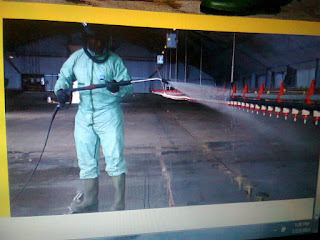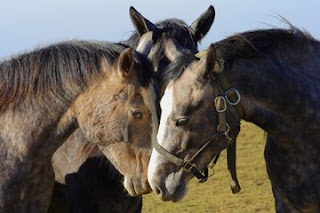BIOSECURITY.
Following simple but specific protocols everyday to positively influence animal health, food safety and public health.
What are the basic protocols in biosecurity?
Biosecurity basically entails, prevention of pathogens from entering premises to ensure there is no disease incidence, and curtail spread of diseases in cases of outbreaks.
Pathogens are disease causing microorganisms that usually have devastating effect on animals, resulting in decreased production and death in severe cases.
Pathogens can be bacteria, viruses, fungi and prion.
Pathogens .
The animal kingdom is riddled with several pathogens that wreck havoc on these animals irrespective of specie.
These pathogens are also of importance to man, especially when these cause zoonotic diseases.
Zoonotic diseases are spread from animals to man, and sometimes there is a reverse zoonoses where man actually spreads the disease to their animals.
Route of transmission.
The basic routes are:
Direct contact.
Aerosol.
Oral.
Fomites.
Vector borne
Zoonoses.
Reproduction.
Environmental contamination.
Mode of transmission.
Direct contact ;disease spread by contact with open wounds, mucous membrane of an infected animal or its secretions/tissue fluids. Disease can also spread through contact with reproductive fluid(blood, urine and saliva) during breeding, or from mother to offspring.
Aerosol; droplets containing the pathogenic agent travel in air and are inhaled as respiratory droplets by animals
Oral; ingestion of the pathogenic agent from contaminated feed ,chewing/licking contaminated objects in environment and water.
Fomites; spread of the pathogen through contact with inanimate objects contaminated by infected animals. Man can act as fomites by transferring these pathogens in through soiled boots, gloves or tools.
Vector; some insects transfer these pathogens from one animal to another through bites.
Zoonoses; these pathogens are transferred from animals to man.
Environmental contamination is key in transmission as some of these pathogens remain infective in the environment for specific periods, thus establishing a foci of infection the area .
Biosecurity procedures
These are simple ,everyday practices to prevent entry of diseases and spread of diseases.
The protocol must be tailored to your farm setting, the type of pathogens affecting your type of animals and public health implication.
The basic biosecurity plan can be broadly divided into 1) isolation,2) cleaning and disinfection 3) waste disposal.
The chemicals to be used will depend on the targeted pathogen,to ensure we get result.
Steps in biosecurity.
Isolation.
Isolation; this refers to keeping these pathogens out by following these steps 1)wearing personal protective equipment which could be disposable or reusable. These include boots, gloves, outer wear and masks/nose guards.
Provision of clean, sterilized clothes.
Prevent entry into animal housing.
Quarantine new animals to farm for at least a month.
Creation of a safe zone in the premises, where there visitors such as veterinarians can change to protective clothing before they have access to animal housing.
Isolate sick animals .
Screen farm premises to prevent entry of wild animals, birds, rodents and reptiles.
Cleaning, washing and disinfection.
Cleaning ,washing and disinfection; cleaning refers to removing debris, dirt and waste from animal housing prior to washing with soap/detergent and then disinfecting the premises.
This procedure also done for tools and implements. Egg trays, feeders/drinkers are also cleaned, washed and disinfected.
Foot bath/tyre dips are also classed here; where there is a provision of a foot dip with disinfectants at the entrance of the animal housing, while the tyres of vehicles coming to the facility are sprayed with disinfectant.
Hand washing points must be on the premises; when you come in you wash hands and sanitize hands.
Water sources such as tanks, containers are washed and sanitized
Waste disposal.
Waste disposal/handling is a major route of spread of diseases, thus biosecurity practices must include proper management.
Waste should be packed at regular intervals and treated with appropriate chemicals/disinfectants before disposal. This is to ensure that what ever pathogen is in the waste does not persist in the environment.
When waste is to be used as manure, these should be bagged and stored neatly, and the area constantly cleaned. Composting the waste in a secluded section on farm is the best practice.
Disinfectants
The disinfectant to be used in animal facility must be non corrosive, non irritating, does not taint equipment, non toxic, have wide spectrum of use and easy to use.
There are basically 9groups that are of benefit; aldehyde group, quaternary ammonium, oxidizing agents , alcohol, hypochlorites,phenols,iodophors, chlorhexidene and peroxide.
The disinfectant of choice will depend on the pathogen in question and nature of case.
Thank you.













 Bio security measures are simple but effective protocols that must be practices to keep infectious agents out of farm facility and also to control spread of diseases in cases of outbreaks. These protocols are simple and easy to comply with, each facility will need a programme tailored to their needs/function.The bio security measures can only be effective if the horses have been vaccination and given other required medication.
Bio security can be discussed broadly on these levels,which are further sub divided to mini levels. Bio security is based on 1) isolation. 2) clean,wash and disinfection .3) waste disposal.
Isolation basically deals with restriction of visitors to stalls, keep your horses away from strange horses, make your barns/stables rodent proof e.t.c
Cleaning,washing and disinfection of tools,implements, stalls,walls, carriages,floors e.t.c.The proper disposal of waste is vital to the success of any bio security protocol.
Horses need care everyday so dont wait until there is an incidence, because it will be too late. check out more http://www.thehorse.com/articles/32882/10-biosecurity-tips-from-top-equine-health-experts?utm_source=Newsletter&utm_medium=in-depth&utm_campaign=09-18-2015
Bio security measures are simple but effective protocols that must be practices to keep infectious agents out of farm facility and also to control spread of diseases in cases of outbreaks. These protocols are simple and easy to comply with, each facility will need a programme tailored to their needs/function.The bio security measures can only be effective if the horses have been vaccination and given other required medication.
Bio security can be discussed broadly on these levels,which are further sub divided to mini levels. Bio security is based on 1) isolation. 2) clean,wash and disinfection .3) waste disposal.
Isolation basically deals with restriction of visitors to stalls, keep your horses away from strange horses, make your barns/stables rodent proof e.t.c
Cleaning,washing and disinfection of tools,implements, stalls,walls, carriages,floors e.t.c.The proper disposal of waste is vital to the success of any bio security protocol.
Horses need care everyday so dont wait until there is an incidence, because it will be too late. check out more http://www.thehorse.com/articles/32882/10-biosecurity-tips-from-top-equine-health-experts?utm_source=Newsletter&utm_medium=in-depth&utm_campaign=09-18-2015








